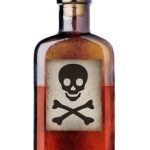 Here is some information that might surprise you. The health hazards associated with aluminum are every bit as dangerous as those associated with cigarettes – the only difference is that aluminum is often hidden in everyday products, so you can’t just ‘give it up.’ According to the Agency for Toxic Substances and Disease Registry, aluminum is extremely abundant and widely distributed and you will always be exposed to it through the food you eat, the water your drink and the air that you breath.
Here is some information that might surprise you. The health hazards associated with aluminum are every bit as dangerous as those associated with cigarettes – the only difference is that aluminum is often hidden in everyday products, so you can’t just ‘give it up.’ According to the Agency for Toxic Substances and Disease Registry, aluminum is extremely abundant and widely distributed and you will always be exposed to it through the food you eat, the water your drink and the air that you breath.
Just because aluminum is one of the toxic hidden metals that are impossible to avoid, it does not mean that you are powerless to reduce your exposure to it. If you care about your health, take the time to learn some of the common kitchen and bathroom products that contain aluminum and take action to avoid them.
The Real Dangers of Hidden Metals Like Aluminum
Advertisement
Aluminum is a heavy metal that is used for a large variety of industrial applications and it is also one of the greatest toxins found in consumer products today. Aluminum enters your body through your lungs, through your digestive tract and through your skin. It builds-up in your kidneys, liver, brain and thyroid and it attacks your central nervous system. Studies have found that aluminum and other hidden metals are potent toxins that harm the brain by causing both inflammation and free radical induced damage.
In fact, aluminum exposure is associated with memory loss and a decline in cognitive abilities in the elderly, as well as degenerative brain disorders such as Parkinson’s and Alzheimer’s Disease. A high level of aluminum exposure may also lead to reproductive issues, anemia, nervous system disorders, headaches, insomnia, soft and brittle bones, glucose intolerance and cardiac arrest.
The Aluminum Hiding in Your Kitchen
Although aluminum is one of the hidden metals and toxins that you cannot completely avoid, you can and should reduce your exposure. Aluminum toxins can leach into your food when you use aluminum based cookware and foil. This can be avoided by using enamel coated steel cookware or cast iron cookware and by avoiding aluminum-based utensils. Also, avoid cooking with aluminum foil and use glass Tupperware as opposed to tinfoil for storing food.
Although aluminum is naturally present in many of the foods that we eat, the levels of aluminum are generally low enough to be considered safe. However, if you are truly concerned about your aluminum exposure, consider eliminating tea, all products made with baking powder, processed cheese and grain products, because they tend to contain the highest amounts of aluminum.
The Aluminum in Your Bathroom
Advertisement
Many cosmetic and medical products expose you to aluminum toxins. Most antiperspirants contain aluminum and you should look for an antiperspirant or deodorant that says aluminum-free on it, at your local health food store. Aluminum is also used in cosmetic tubs and for the coloring of certain cosmetics, although the levels may be too low to cause any real damage. Other cosmetic products that may contain aluminum toxins include: body lotions and creams, shampoos and conditioners, soaps, suntan lotions and lip balms.
RELATED READING: Top Health Risks You Shouldn’t Take
Aluminum is especially abundant in your medical cabinet. Many antacids contain aluminum and studies have linked a large intake of aluminum-containing antacids to calcium loss and osteoporosis (weak bones). Due to the fact that post-menopausal woman have a higher risk for developing osteoporosis, it is considered especially important that they avoid aluminum-containing antacids. Aluminum is also found in a large variety of over-the-counter medications and prescription drugs. You should read labels and consult with your pharmacist in order to identify whether or not the over-the-counter products you use contain aluminum. Finally, if you are on any prescription drugs, ask your doctor if they contain any aluminum. If so, he or she may be able to prescribe an aluminum-free alternative
